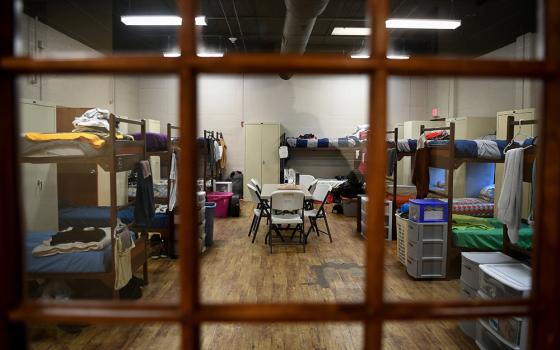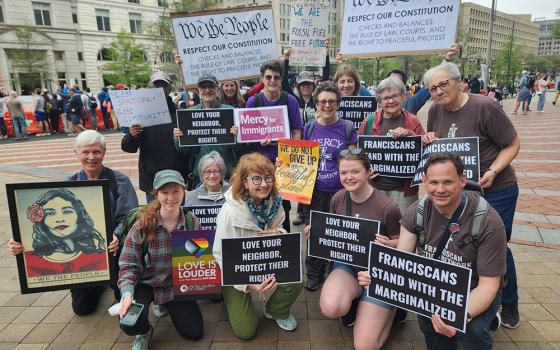
Pope Francis blesses a sick man Sept. 22 inside the Basilica of Our Lady of Bonaria in Cagliari, Sardinia. (CNS/Paul Haring)
This is the fifth and last of a series of articles examining Pope Francis' recent interviews. This collection of essays will be published in the Oct. 11-24 print issue of NCR.
I believe Pope Francis is trying to ignite massive culture change within the Catholic church.
And I see St. Ignatius of Loyola's spiritual fingerprints throughout the pope's spirituality and leadership style.
"Who is Jorge Mario Bergoglio?" Jesuit Fr. Antonio Spadaro asked the pope during their now-famous August interviews. While most politicians or celebrities would have batted a self-promoting answer to that softball question, here's what the pope said: "I am a sinner." He was taking a page from Ignatius of Loyola's Spiritual Exercises, which include some bruising meditations on personal sin: "I will look upon myself as a sore and abscess from which have issued such great sins."
But that's no "downer" in Francis' and Ignatian spirituality; it's plain speaking about the human condition. And even though postmoderns here in cosmopolitan New York might reject Catholic "sin talk," all can resonate with the pope's vision of a "battlefield hospital" church that focuses first on healing. We're all deeply flawed, popes included, but inherently dignified and unconditionally loved by God nonetheless.
That's been a lifelong refrain of Bergoglio's. While writing Pope Francis: Why He Leads the Way He Leads, I communicated with various Jesuits who trained under him when he was rector of a large Jesuit seminary. Jesuit Fr. Hernán Paredes told me, "It was important to Bergoglio that we love ourselves as we are." Paredes shared a curious anecdote about an Ecuadorean colleague who one day proudly donned a traditional jacket, llama images woven throughout. An Argentine seminarian mercilessly ridiculed the guy's outfit as if he were some rube newly arrived in the big city.
So Bergoglio invited the Argentine to wear the jacket for a day as a walking meditation for the whole community: Each person is fundamentally dignified, worthy of respect as a birthright; God's constant love is not contingent on what others think of us, our status or our sinfulness. That key message of Catholicism and Ignatius' Spiritual Exercises is foundational to Francis' vision for the church. In the interviews, he spoke about a church that "is the home of all, not a small chapel that can hold only a small group of selected people."
When he visits refugees on Lampedusa, embraces the disabled in Vatican Square, says he wants a church that is "for the poor," or encourages us to spread word of God's mercy, he is implicitly saying that our chapel is still too small. We have not yet made it a home for all, and fixing that is every Catholic's job because, in the pope's Ignatian worldview, we are not just loved sinners, we are each personally called sinners, called to labor alongside Jesus and spread Jesus' good news. That gets to a second powerful Ignatian theme in the Spadaro interviews: the frontier spirit.
Francis said he was initially drawn to the Jesuits for three reasons, one of them its "missionary spirit." Ignatius of Loyola exhorted Jesuits to live "with one foot raised," ever ready to seize the next opportunity. He also instituted a special fourth vow of obedience for many fully formed Jesuits: to be always available to be sent on mission by the pope.
That mindset unleashed extraordinary centrifugal energy among early Jesuit generations, who famously sought out the frontiers of the world then known to Europeans. The pope's own Argentine homeland, for example, is still dotted with ruins of remarkably innovative settlements -- the so-called Paraguay reductions -- that Jesuits pioneered alongside indigenous persons.
But Francis is inviting us to understand "frontier" in a much more expansive way. Catholicism's 21st-century frontiers are less about geography and more about those who don't see much value in organized religion or who have been overlooked or excluded. The pope told his interviewer that he admired early Jesuit Fr. Peter Faber's "dialogue with all ... even with his opponents." And, the pope said, "let us try also to be a church that finds new roads, that is able to step outside itself and go to those who do not attend Mass, to those who have quit or are indifferent."
That's not a platitude; that is his strategy. Another Jesuit interviewed for my book project said Fr. Bergoglio was once asked to assume responsibility for a new parish in an impoverished community and drafted some seminarian volunteers to assist him. To do what? Well, walk the neighborhood. Meet everyone, not just the churchgoers. Seek out the poorest and see what could be done to help them. When the seminarians returned from these visits, Bergoglio used to check whose shoes were dusty -- who was showing the frontier spirit to meet people where they really live.
After the team discovered just how poor their neighbors were, one Jesuit remembers Bergoglio saying something like, "We can't just sit around here with our arms crossed while we have everything and those people don't even have enough food to eat." So they took action, putting a big pot in a field to launch a primitive soup kitchen.
This restlessly energetic, outgoing, innovative style is fundamental to the "frontier spirit" Francis wants to instill. In his homily on the day after his election, he said, "Our life is a journey, and when we stop moving, things go wrong." The frontier is now our own neighborhood, not half a world away. We will see that clearly by embracing the great mantra of Ignatian spirituality referenced by the pope: to find God in all things. That means finding God present not only at our eucharistic meal, but by staffing those "battlefield hospitals" that will heal the suffering, alienation, hopelessness or poverty of our neighbors.
At the beginning of this essay, I claimed Francis is trying to ignite a massive culture change inside our church. Massive culture change? Hyperbole? Well, consider a sprinkling of words and phrases lifted from the pope's interview comments about the church, Jesuits or Catholic life: "live on the border and be audacious," "be searching, creative and generous," "find new roads," "dialogue with all ... even with opponents."
Unfortunately, few objective observers would fully associate those traits with our church today. Francis is asking all of us to help lead the culture change that will bring those traits more fully alive. Yes, all of us helping to lead. After all, he said bishops "must be able to accompany the flock that has a flair for finding new paths." Let's get our shoes dusty, and let's start finding new paths.
Monday: "The real test of Francis' reform: touching the spiritually poor," by Hans Küng
Tuesday: "It will be hard to go backward after Francis' papacy," by Richard Rohr
Wednesday: "Francis wishes to release Vatican II's bold vision from captivity," by Richard Gaillardetz
Thursday: "Pope Francis, gender equality and the idea of machismo," by Michelle A. Gonzalez
[Chris Lowney, author of Pope Francis: Why He Leads the Way He Leads (Loyola Press), was formerly a managing director of J.P. Morgan & Co. and now chairs the board of Catholic Health Initiatives, one of the nation's largest health care/hospital systems]


